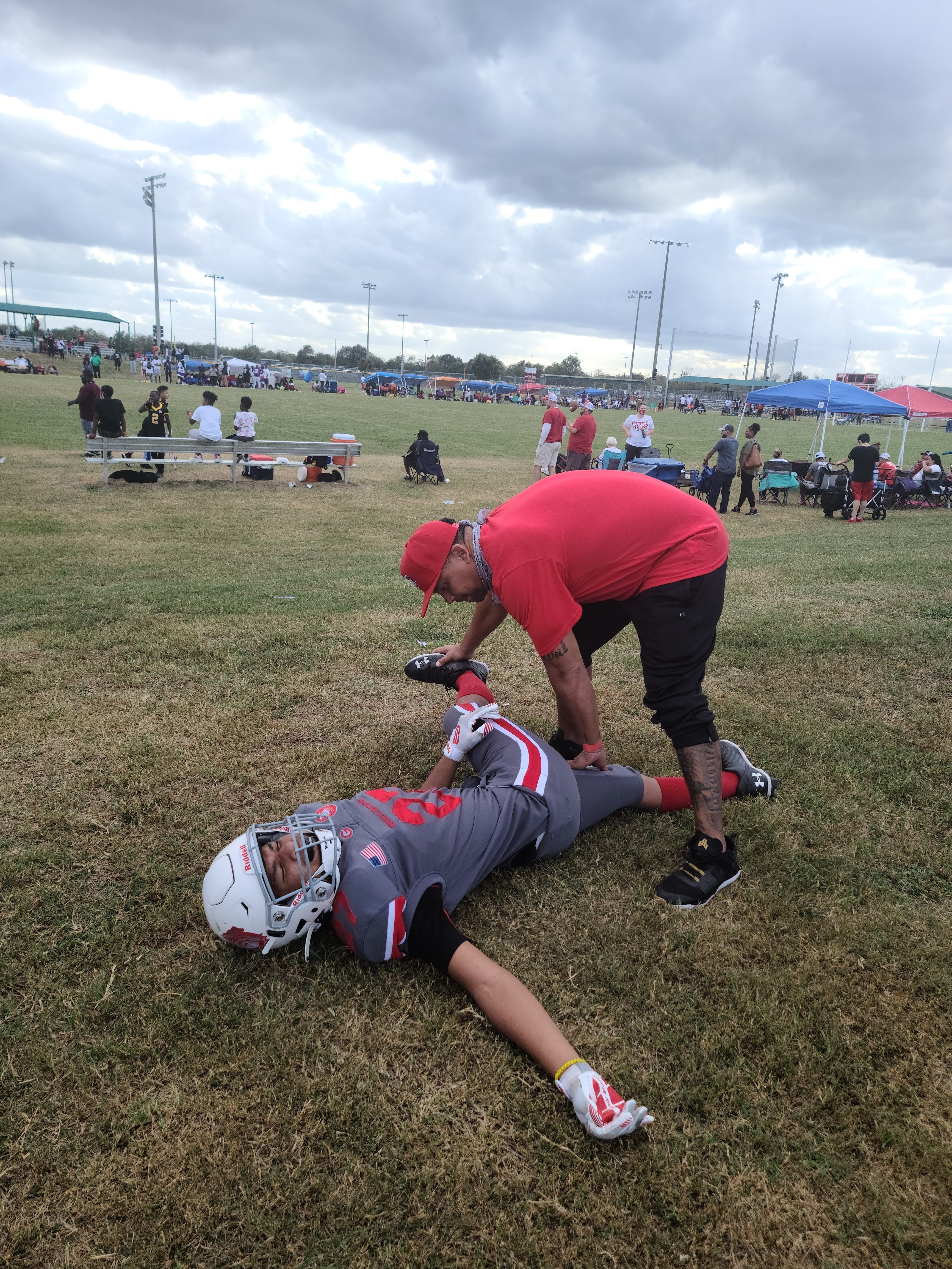Priest Simpson jumped high to catch a football during a game, but he fell to the ground fast when his muscles pulled the still-growing part of his tibia away from his leg and turned it upside down. His leg looked crooked.

“I thought it was dislocated because it was still connected to other part of my knee,” Priest said. His worried parents got him to the emergency room at UTMB League City Hospital.
But his leg wasn’t dislocated. Priest had a displaced avulsion fracture of his tibial tubercle.
“This is a big injury for an athlete but also for anyone who expects normal function of their leg,” said Dr. William Weiss, an orthopedic sports medicine doctor with UTMB Health who treated Priest soon after he arrived at the hospital. “This
injury completely disrupts the extensor mechanism of the knee that is the primary mechanism for generating power for running and jumping, which are some of the things Priest does well!”
Priest’s injury was on the more severe end of the scale, requiring an operation with screws to reduce and secure the fragment with patellar tendon tensioning. Dr. Weiss anticipated Priest’s continued growth.
“He recovered well and was discharged from the hospital with the expectation he would return to sports. This injury can end athletic careers for young athletes, but that is not what Priest or his parents – or me – wanted of course.”
The fracture happened in April 2021, and three months later, Dr. Weiss cleared Priest for full training. By September 2021, he cleared him to return to full sport without restrictions. That fall, Priest competed as part of an elite football team representing
Texas on the national level.
Then Priest and his family temporarily moved to Africa as part of his family's missionary commitments, Dr. Weiss stayed in touch.
“What stuck out with us, and the reason why we stayed in contact even out of the country, was how Dr. Weiss spent an extreme amount of time with Priest,” said Ariel Simpson, Priest’s mother. “He didn't just rush. We know he's busy.
We know he has a lot of patients. But he took his time with Priest. He saw him multiple times before we left the country again. He gave advice beyond the surgery and showed extreme care for Priest.”
Some of Dr. Weiss's advice was to get physical therapy for Priest to strengthen his muscles and tendons around the bones and the ligaments.
“And that really helped with pain,” Ariel Simpson said.
“I started this physical therapy, and then I went to the gym and started working on my legs until I felt strong enough to get back into sports,” Priest said.
He continues working with a trainer on a well-rounded routine that includes running, balancing, band work and weightlifting. He works out with the trainer every other day for 90 minutes in addition to his sports practices and games.
“Bottom line is that this is a great young man who has overcome a significant injury and continues to be very active in various sports with great potential for his future,” Dr. Weiss said. “I expect great things from him in all aspects
of his life, not just sports.”
Priest, now 14, and his family visited friends [extended family] in Texas in December. They visited with Dr. Weiss in person before they returned to their missionary work in Africa.
“As a parent, it's difficult to watch your child in any kind of pain at all,” Ariel Simpson said. “We didn't know how he was going to recover or what that was going to look like. But it's incredible if you are surrounded by a medical
staff and specifically a surgeon who cares. It made a difference to us very deeply in this stressful, heartbreaking moment.”
“To see how strong he is today really takes your breath away when you think about how he's recovered,” said Sean Simpson, Priest’s father. “Now he's 6 foot. He's healthy. He's 170 pounds. Seeing what he can do and work out his
full body— it's just impressive.”
Priest, who plays soccer and basketball too, has a strategic game plan for when he returns to live in the United States.
“I want to come back to play high school football and get a scholarship to play college football,” he said.
And he’s still growing.